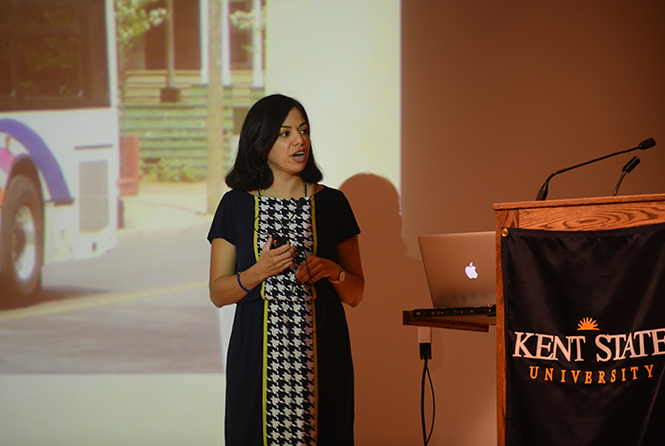Author and minority rights activist calls for increased awareness of feminism on campus
Daisy Hernandez speaks about her experiences of being a latina feminist on Wednesday, Oct. 2, 2013 in the KIVA. The event was sponsered by the Spanish and Latina Association and Wick Poetry Center. Photo by Leah Klafczynski.
October 3, 2013
Kent State minority and gay rights supporters gathered Wednesday in the Kiva to discuss feminism’s impact on society. Daisy Hernandez, co-editor of the book “Colonize This! Young Women of Color on Today’s Feminism” gave her perspective as a Latina and queer advocate.
During her presentation entitled “Feminists and Women of Color in Literature Today and in the Past,” Hernandez explained how she came to identify as a feminist and also identified other minority women who share her passion for feminism and gay rights.
“I did not have any negative association with (the word feminism),” said Hernandez about her first experiences with women’s studies in college. “I also did not have any positive associations with it, either.”
While riding the local bus, Hernandez recalled how something clicked about women in society. The feminist click, as she called it, is when a woman recognizes that she is part of something bigger than herself.
Growing up in New Jersey as a poor female minority, the daughter of immigrants, Hernandez said she learned quickly how society viewed Latinos and women of color. Being stereotyped by ethnicity, she explained, had an impact on her future as a writer and advocate.
“Our experiences are varied,” said Hernandez. It is those experiences, she explained, that cannot be fit into socially defined stereotypes. There is intersection of concepts.
Intersection, Hernandez said, is the idea that minority, gay rights, and feminist communities have shared identities. When individuals recognize that intersection, she said, there is a sense of empowerment that accompanies it. This resonated with the members of the audience like Drew Canfield, sophomore sociology major.
“As a feminist, I already feel empowered that way,” Canfield said. “But defining myself within the queer community is a new thing for me.”
For Hernandez, it took a while for her to identify as queer but after studying the history behind the word, she said it made sense.
Many of the students who attended the presentation voiced their opinions on women’s rights and feminism, both at Kent State and society.
“I think to be a feminist you’re a humanist,” said Mary Shaffer, sophomoreYEAR political science major. She said feminism was like looking through a different critical lens.
Being critical on how individuals view society, said Shaffer, can affect how communities react, especially when issues relate to race and gender, a statement Wolfgang Davidson, freshman anthropology major, can agree with.
“The media portray society as being post-racial,” Davidson said. “It is, whether intended or not, inherently racist and sexist to believe that we are in a post racist and post sexist society when we aren’t.”
Coming from a predominantly white neighborhood to Kent State, explained Juliah Feliciano, sophomore accounting major, was an eye-opening experience.
“In college…color isn’t an issue anymore,” said Feliciano. “It’s still an issue, but it’s not as big as it was. No one points it out unless they have an issue with it. You just look past it and get to know the person.”
Hernandez advocates for a women’s studies requirement in college, something Shaffer and Canfield said they both agree with.
“I think a women’s studies major would be great,” said Canfield. “I think a lot of people think the fight for equality is over, and it’s not.”
Matt Merchant is the ethnic affairs and education reporter for the Daily Kent Stater. Contact him at [email protected].

























